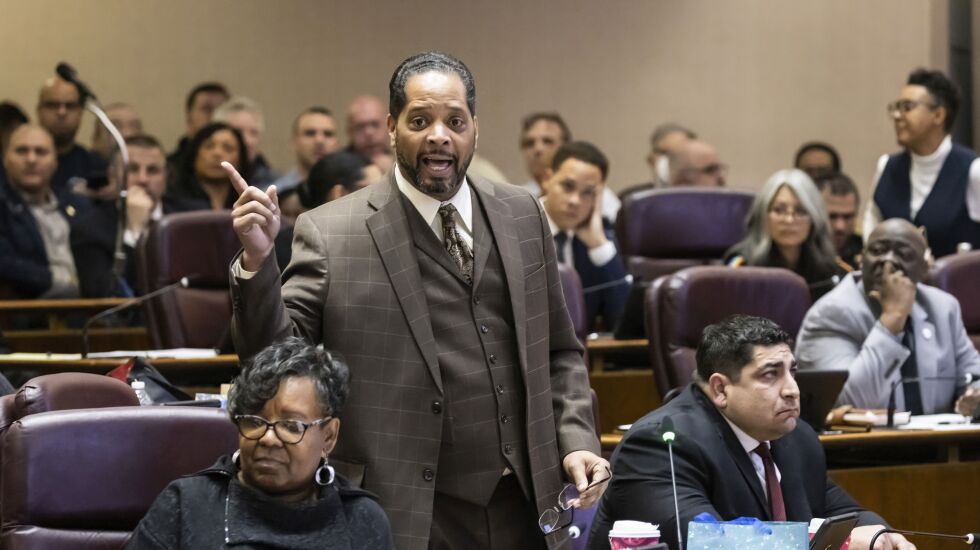
After several fits and starts, the City Council will try again Thursday to hold a special meeting to determine whether to give Chicago voters an opportunity to weigh in on the migrant crisis.
Ald. Anthony Beale (9th) has been trying for weeks to put an advisory referendum on the March ballot asking voters whether or not Chicago should remain a sanctuary city.
Frantic efforts to prevent that from happening at a special meeting last month ultimately resulted in the bullying allegations against Ald. Carlos Ramirez-Rosa (35th) that forced Ramirez-Rosa to resign as Mayor Brandon Johnson’s City Council floor leader and Zoning Committee chair.
That was followed one week later by a Rules Committee meeting called to substitute the simple sanctuary city question with a softer, more innocuous version.
That effort failed during a raucous meeting abruptly adjourned after alderpersons were shouted down by an angry crowd that Rules Committee Chair Michelle Harris (8th) ordered forcibly removed.
On Wednesday, Beale tried briefly to suspend the rules for immediate consideration of a new version that states, “Should the city of Chicago limit its designation as a sanctuary city by placing spending limits on its public funding?”
He asked for an immediate vote because “my mother just had a procedure and I’m probably gonna have to take care of her” on Thursday. Beale called it an “olive branch.”
But after conferring with Johnson and his corporation counsel on the rostrum during a brief recess, Beale withdrew his motion. “See you tomorrow,” he told the mayor.
Sources said Johnson has directed his City Council allies to show up and, he hopes, defeat Beale’s advisory referendum.
If the advisory referendum does makes it on the ballot, Beale said he has no doubt Chicago voters will overwhelmingly reject remaining a sanctuary city.
The fact that the city spent $985,621 to prepare a contaminated industrial site in Brighton Park for a tent city that was ultimately rejected by Gov. J.B. Pritzker adds even more fuel to the fire, Beale said. That money — for site preparation, equipment and material — will not be reimbursed by the state.
“This will pass maybe 75-25 or 80-20. That’s how angry people are with the way things are going in this city,” Beale said Wednesday.
“They’re angry about spending hundreds of millions of taxpayer dollars and not getting city services. They’re angry about spending money on a humanitarian crisis manufactured by the federal government and we’re bearing the brunt of it. They’re mad that we’re spending money on this and not police and not prevention. They’re mad about raising taxes and not getting anything tangible as a result of it. People are fed up.”
Johnson told reporters during a post-council news conference that he has “de-compressed” 21 of 22 police stations with “only one left.”
Asked whether Chicago would have the capacity to handle another surge of new arrivals without a tent city, the mayor did not answer, saying only that his administration was “searching for property all over the state of Illinois” to house migrants.
In other action at Wednesday’s meeting, the City Council:
• Revamped and strengthened Chicago’s hate crime ordinance for the first time in 30 years. The so-called a “Chi vs. Hate” ordinance would create the category of “hate incident” and allow Chicagoans to report those less serious incidents by calling the city’s 311 nonemergency number or by using the 311 app.
• Signed off on $10.75 million in settlements tied to allegations of police abuse.
• Broadened the definition of registered lobbyists to include nonprofits after adding safeguards to avoid unnecessary costs and red tape.
• Empowered the city to tow and impound buses filled with migrants that violate the city’s ground rules and operating hours.
• Delayed implementation of Chicago’s paid leave ordinance until July 1 and authorized a “cure period” and several other fixes that, business leaders claim, do not go nearly far enough.
• Signed off on an amended tax-increment-financing agreement — with an additional $8 million city subsidy — to help transform a notorious, 21-acre dump site at Roosevelt and Kostner into a solar-powered hub for light manufacturing with two innovation centers for workforce training, a park and retail space.







